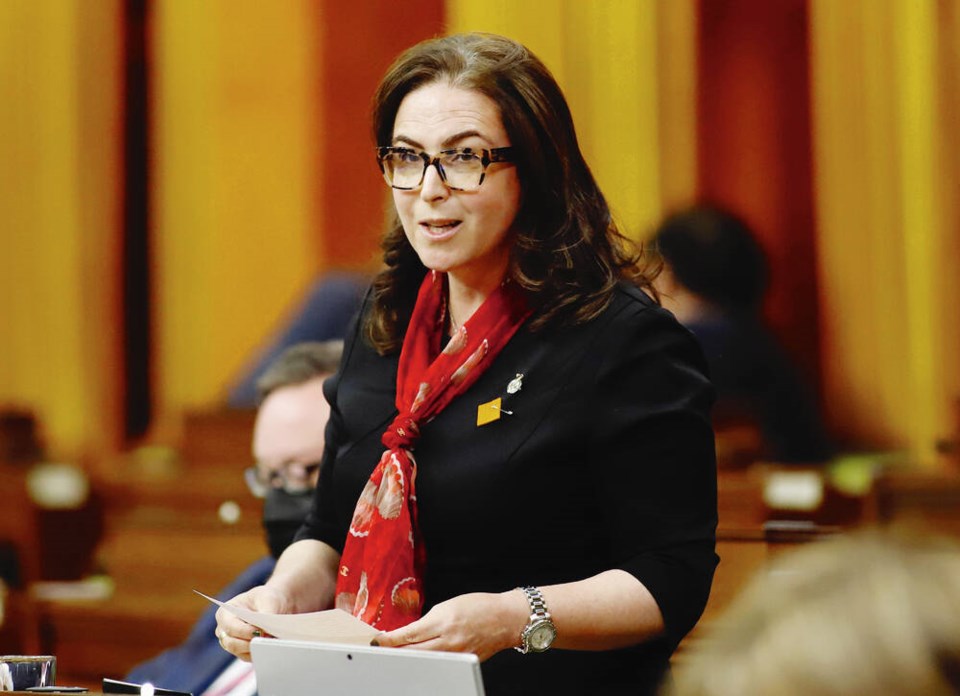The federal minister of Mental Health and Addictions says she has asked her department to look into the safer supply program, including accounts of diversion of prescribed opioids.
“We’re taking a deeper look into it in the department so that we move with evidence and not anecdotal discussions or from fear,” Ya’ara Saks told the Times Colonist in a media availability in Richmond on Monday.
Saks, who was in B.C. this week to announce a new suicide hotline — 988 — to be available around the clock in Canada by Nov. 30, said it’s important to differentiate between “perhaps stigma-driven positions and understanding what we truly need to do in harm reduction and bringing people to safety and stabilization.”
About 225,000 people in B.C. use unregulated drugs, including 100,000 who have an opioid-use disorder, prompting calls for increased access to a safer drug supply to prevent people from being poisoned by the toxic illicit-drug supply.
Now in its eighth year, the toxic-drug overdose crisis has claimed more than 13,000 lives, and continues to claim about six lives a day.
As part of a safer-supply program aimed at saving lives, pharmaceutical-grade hydromorphone has been prescribed as an alternative to illicit drugs such as heroin or fentanyl.
The federal government in 2020 funded 10 pilot projects to distribute hydromorphone, with the brand name Dilaudid, to people addicted to opioids in British Columbia, Ontario and New Brunswick.
Critics including BC United opposition members have raised the issue of users selling their hydromorphone on the streets to buy more potent drugs, potentially leading vulnerable people to becoming addicted.
Federal Conservative leader Pierre Poilievre has said he would get rid of safer-supply programs if he were elected and put resources into treatment instead.
On Sept. 23, an open letter on the issue was sent to Saks from 17 addictions specialists in Canada —including Dr. Robert Cooper, who served on the board of the Canadian Society of Addiction Medicine, as well as Dr. Paul Farnan, a clinical associate professor in the department of family practice at UBC.
The physicians said “unsupervised free government-funded hydromorphone” was harming communities by increasing the number of opioids on the street.
“We are regularly seeing and hearing in our practices that diverted hydromorphone is causing harm to both adults and children,” said the letter, which called on the government to ensure all hydromorphone prescribed to people with opioid addiction is provided in a supervised fashion or that funding be ceased.
Saks noted that diversion of any prescribed pharmaceutical, whether it’s part of a harm-reduction program or from an individual’s medicine cabinet, is illegal.
But she said there needs to be a balance between public health — because the opioid overdose emergency is a public health crisis and harm reduction is health care — and ensuring community safety.
“Safer support programs in this country are a prescription model that are a form of working with individuals with substance use who struggle with it to ensure that they are brought to stabilization and safety as they move through their own journey of addiction,” said Saks.
She added, however, that diversion of safer-supply drugs is a concern.
“Understanding that there are concerns, we have tasked the department to take a deeper dive into some of the anecdotal discussions that have been happening in various spaces to ensure that we are driven by evidence and that we are driven by the data to make the best decisions possible for those who need our help.”
A B.C. Coroners Service death review panel reported this month that the increased toxicity, volatility and unpredictability of the unregulated supply of drugs in the province is the primary driver of increased drug-poisoning deaths.
Fentanyl was present in more than 85 per cent of toxic-drug-overdose deaths last year.
The federal minister was also asked about the death review panel’s key recommendation that people using deadly toxic street drugs be given a greater variety of more potent pharmaceutical opioids and stimulants under an expanded safer-supply model, without a prescription. Proponents say that would prevent the drugs being diverted as well as preventing deaths.
“We always guide our policy with evidence and with expertise from a wide variety of voices and inputs,” said Saks, noting that health care is a provincial jurisdiction. “So this would be a conversation that the province would have to have before the federal government could contemplate it.”
Saks pointed out that B.C. Minister of Mental Health and Addictions Jennifer Whiteside has already rejected providing people at risk of dying from the toxic-street-drug supply pharmaceutical alternatives without a prescription.
Provincial health officer Dr. Bonnie Henry is also reviewing the province’s safer-supply program and is expected to submit her report to government in a few weeks.



